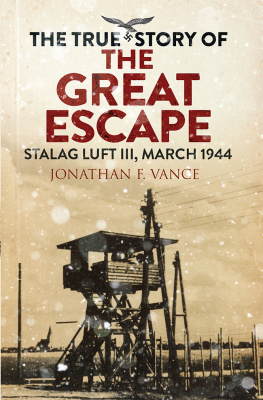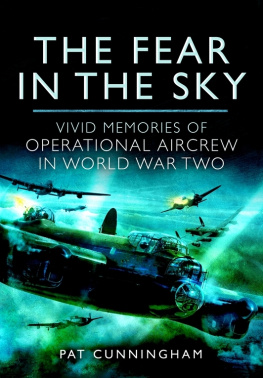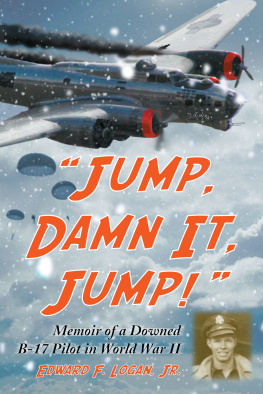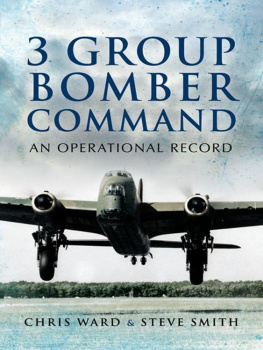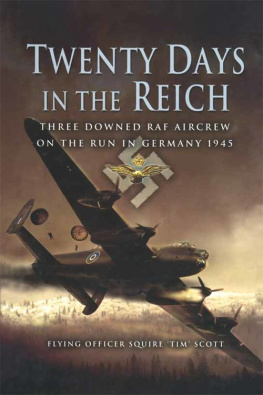Twenty Days
in the
Reich
Twenty Days
in the
Reich
Three Downed RAF Aircrew
in Germany during 1945
Flying Officer Squire Tim Scott

Pen & Sword
AVIATION
This edition first published in Great Britain in 2006
By Pen & Sword Aviation
An imprint of Pen and Sword Books Ltd
47 Church Street
Barnsley
South Yorkshire
S70 2AS
Copyright Squire Scott 2006
ISBN 1 84415 390 8
1 84415 333 6
The right of Squire Scott to be identified as the Author of
this Work has been asserted by him in accordance with the
Copyright, Designs and Patents Act 1988.
A CIP record for this book is available from the British
Library.
All rights reserved. No part of this book may be
reproduced or transmitted in any form or by any means,
electronic or mechanical including photocopying, recording
or by any information storage and retrieval system, without
permission from the Publisher in writing.
Typeset in the UK by Mac Style, Nafferton, E. Yorkshire
Printed and bound in the UK by CPI UK.
Pen & Sword Books Ltd incorporates the imprints of Pen &
Sword Aviation, Pen & Sword Maritime, Pen & Sword
Military, Wharncliffe Local History, Pen & Sword Select,
Pen & Sword Military Classics and Leo Cooper.
For a complete list of Pen & Sword titles please contact
Pen & Sword Books Limited
47 Church Street, Barnsley, South Yorkshire, S70 2AS,
England
E-mail: enquiries@pen-and-sword.co.uk
Website: www.pen-and-sword.co.uk
Dedication
To the American Third Army
Contents
T his is not an escape story. It is therefore just a little bit different from the many excellent narrative accounts of the breath-taking adventures of those who eluded their Nazi guards and made their way back, unaided or otherwise, to their own lines.
This tale then, is one, simply told, of the experiences of three members of the crew of a Bomber Command Lancaster who baled out of their crippled aircraft on Thursday 15 March 1945. They were actually prisoners-of-war for fifteen days out of twenty-two spent on the continent of Europe, although their time behind the barbed wire was limited to a bare thirty-six hours.
If any of their several attempts to escape had been successful, this would just be another escape story and, in any case, would probably never have been written. Some part of the authors purpose will have been achieved, if the reader gains just a tiny insight into what went on over the other side during those history-making days of March and April 1945.
O il had been leaking from the Lancaster port inboard engine practically from the moment that we had crossed the French coast on that memorable March afternoon.
A huge anticyclone had covered the whole of the British Isles and most of Europe and for several days the weather had been gloriously fine. The weather not only gave us our third op in successive days, but also played an important part in the miracle of our liberation that was to follow.
It was our thirty-first sortie and that morning, as we had strolled around the dispersal, chatting to the ground crew in those tense few minutes before it was time to taxi out to the end of the runway, we had groused mildly at the working of the minds of those high ups. Only a few days before, they had thought fit to increase the number of trips in a tour from thirty to thirty-six.
We reflected that, but for this display of inconsideration, we should have finished our tour yesterday. However, we were not unduly dismayed, because with the weather as it was, we did not think that it would be long before we were enjoying our well-earned fortnights end of tour leave. I remember my leg being pulled, because although I had always declined to join the rest of the crew in their occasional drinking orgies, I promised them faithfully that on this auspicious event I would get as drunk as any of them!
Both Jack, our rear-gunner, and Roy, the mid-upper gunner, noticed the oil at a very early stage of the trip and the Skipper had accepted the information with his usual polite calm. We knew our Skipper well and whilst later on we had plenty of time to reflect that some captains on the squadron might, quite legitimately have put the port inboard engine out of use (an operation known as feathering, which if implemented soon enough can render an engine ineffective and yet perfectly harmless), dropped the bomb in the Channel and returned to base on three engines, I doubt if any of us expected or wanted such a decision from him.
I recalled the occasion when all my secret equipment had packed up on a long night-stooge operation to Munich. I can still hear the Skippers almost ghoulish chuckle when he told me that I now had a golden opportunity to display my skill at ordinary dead reckoning navigation. As the latter consists mainly of paper and pencil theory, I knew that the Skipper was as well aware as I was, that our chances of even being able to locate the distant target were not promising.
No, as long as there was any chance of reaching the target, we knew that we should press on. Although reports were coming through from the rear that the whole of the back portion of the aircraft was covered in oil from the faulty engine, we suffered no loss of speed. We duly reached our objective, which was near the town of Arnsberg, in the eastern Ruhr area, on time and in our correct place in the formation.
We unloaded our single 5-ton bomb, with our blessing for any unfortunate Germans who might happen to be directly underneath. We had flown about ten minutes on the homeward journey when the fun commenced. Arthur, the engineer, announced that the port inner engine would have to be feathered, as the gauges were showing hardly any oil content. The revolutions were already building up far beyond their maximum.
Go on then, have a go and see if shell feather, came the Skippers matter-of-fact voice over the intercom. Now that we were rid of our great bomb load, the loss of one engine would not be serious. Even at that stage I had no suspicion of any immediate danger, even if the faulty engine should fail to feather. The last entry in my log read 1650 port inner unserviceable . I had then left a short space in which, as I thought, to insert feathered or otherwise as the case might be.
Arthurs voice came up as placid as his captains, Its no use Skip, she wont feather shes batting round like the devil and will be on fire in two ticks if we dont look out.
The Skippers voice came over the intercom, still completely unperturbed. He was calling up the formation leader and informing him of the emergency in our aircraft. The next words I heard were Fix parachutes.
Mechanically, I obeyed and acknowledged the order. It seemed almost like a training exercise. The only coherent thought that I can recollect was that it was going to be exceedingly awkward grappling with my navigation instruments with a parachute fixed to my chest.
OK. Jump! This order seemed to come in less than a minute. I heard a startled Jump? from some unknown member of the crew, but did not stop for any more.
I was delayed a few seconds as my telephone lines and oxygen tube became entangled. I can still see the terribly anxious look on the Skippers face as eventually I slipped past him on my way to the front hatch.
Never in the whole of my time in the RAF had the value of training and discipline been more forcibly presented to me. I didnt think about it then of course all I did was sit with my ripcord handle well clutched, over the absurdly small hole in the floor, duck my head and in no time at all I was in the nice, clear, blue air!
But a lot of things came to me later on. Aircrew of course, contrary to popular belief, do not practise parachute jumping. Unlike an airborne trooper, whose job depends on his skill at baling out, we were trained to regard a jump as a purely last line of defence to be used in an absolute emergency Ones first effort, would, one hoped, be the only one that would ever be necessary during a whole flying career.


